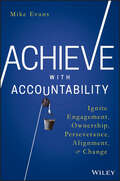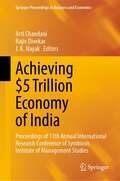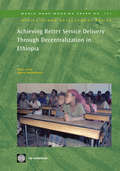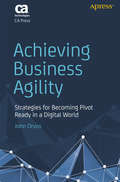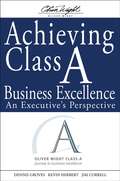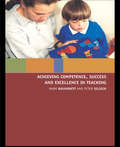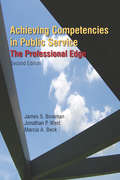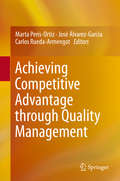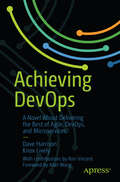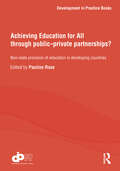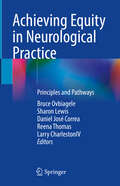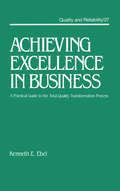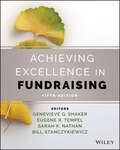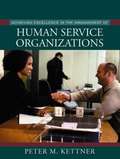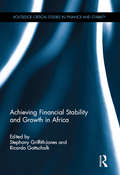- Table View
- List View
Achieve with Accountability: Ignite Engagement, Ownership, Perseverance, Alignment, and Change
by Mike EvansACCOUNTABILITY IS THE CATALYST THAT IGNITES: Accelerated Change, Robust Employee Engagement, Intensified Ownership, Relentless Perseverance, Impeccable Alignment, and propels individuals, teams and organizations to desired results. Accountability crumbles silos, boosts teamwork and collaboration, strengthens camaraderie, creativity, resiliency, agility, trust, and communication Achieve with Accountability presents a recipe for awakening the whatever it takes attitude to achieve what matters most to individuals, teams and organizations. Discover how to transform accountability into a positive, engaging and forward looking experience that will secure your position in the new world of work. Learn how to kick-start a revolution that will blast your team or organization to new heights of success. We are in a brawl with no rules, where the fast, flexible and agile will eat and spit out the slow, over-thinking and complacent. When you relinquish accountability you place your future in the hands of other people or events. It's only by taking accountability and ownership for our circumstances that we can achieve what matters most. Embrace the accountability fundamentals that have helped individuals, teams and organizations for years to achieve and exceed what matters most. With the world coming at us fast and furious every day, it's easy to feel like you've lost control of your own life, your team or your organization. By choosing to take and lead accountability you reclaim control and are able to direct your own destiny. Develop the agility, flexibility and resiliency to adapt and thrive during constant change Foster a can-do, resolute, solutions focus in the face of difficult challenges, obstacles and barriers Eradicate the blame-game and vanquish excuse-making that stifles peak performance Shed feelings of disarray, discomfort, apathy, entitlement, indifference and despair Take control over your circumstances and achieve what matters most Unleash voluntary contributions of discretionary performance that is often left untapped in individuals, teams and organizations Establish unshakable trust and credibility Accountability is a current that feeds into the slipstream of success. Your performance, your decisions, and your results are all your responsibility; when you operate from that premise, magic happens. Achieve with Accountability shows you how to nourish that can-do mindset, so you can begin to achieve what matters most.
Achieving $5 Trillion Economy of India: Proceedings of 11th Annual International Research Conference of Symbiosis Institute of Management Studies (Springer Proceedings in Business and Economics)
by Arti Chandani Rajiv Divekar J. K. NayakThe contents of this volume focuses on the economic issues such as income inequality, foreign direct investment, world income classification, business issues such as customer churn analysis, internal branding, human resources issues among others. The papers were presented during the 11th Annual Research Conference of Symbiosis Institute of Management Studies (SIMSARC2020). The book also focuses on the information technology and its application for the business in the form of social media, role of artificial intelligence etc. The contents of the volume are highly relevant, consisting of recent data and results, and based on strong research and statistical analysis. They widely cover the business, society and environmental issues faced in the present times, and the challenges faced by India to reach its goal of a trillion dollar economy. The papers not only discuss the issues but also come up with research based solutions and will be of interest to scholars, corporates, policy makers, and academics alike.
Achieving Better Service Delivery Through Decentralization in Ethiopia
by Andrew Sunil Rajkumar Marito GarciaAchieving Better Service Delivery Through Decentralization in Ethiopia examines the role decentralization has played in the improvement of human development indicators in Ethiopia. Ethiopia has made major strides in improving its human development indicators in the past 15 years, achieving significant increases in the coverage of basic education and health services in a short period of time. Improvements took place during a period of massive decentralization of fiscal resources, to the regions in 1994 and to woredas in 2002-03. The devolution of power and resources from the federal and regional governments to woredas appears to have improved the delivery of basic services. Surveys of beneficiaries reveal that they perceive that service coverage and quality have improved. Beneficiary satisfaction has increased markedly in education, and less conspicuously in water and health services. In the south, the decentralization to woredas in 2002-03 tended to narrow differences in per capita expenditures on education and health across woredas. Decentralization disproportionately favored woredas that are remote (more than 50 kilometers from a zonal capital), food-insecure, and pastoral, suggesting that decentralization has been pro-poor. Decentralization also narrowed the gap in educational outcomes between disadvantage and better-off woredas, especially in the south. Pastoral, food-insecure, and remote woredas gained in terms of the educational outcomes examined (gross enrollment rates, grade 8 examination pass rates, repetition rates, pupil-teacher ratios, and teacher-section ratios).
Achieving Business Agility: Strategies for Becoming Pivot Ready in a Digital World
by John OrvosKnow how to lead and establish business agility in your organization. Benefit from clear, actionable steps based on change management truths that have been long underutilized and have limited the success of agile expansion into your business. This book provides a pragmatic framework for leading your business toward shifting to an agile mindset. Achieving Business Agility offers strategies and concrete examples to engage business executives and will teach you how to effectively execute these strategies. Whether you are a delivery executive, a change advocate, a consultant, a business leader, or a newcomer to agile, you will learn clear actions from a practical, business-oriented perspective that is vital to effect change and bring agile into your business. The book is structured in three sections. The first provides you with a deep understanding of each of four strategies. The second section tells the story of a company that applied these strategies through the eyes of several key players. The last section helps you get started applying what you learned in your own company. What You’ll Learn Get the attention of your executives by alerting them to a company problem that can impact them personally and create a sense of urgency to address itCollaborate with your executives in a way that gets them to open up and to see how their operating model is a contributing cause to the company problemDemonstrate how your executives can specifically benefit from a new agile business operating model and address the company problemCreate a reinforcement structure on a larger scale to establish agile as the new standard operating model in your organization Who This Book Is For Managers, business leaders, and consultants at/for large enterprises or small startups who want their company to better compete in today’s fast-moving markets that present threats and opportunities at every turn. No agile expertise is required.
Achieving Business Competitiveness in a Digital Environment: Opportunities in E-commerce and Online Marketing (Contributions to Management Science)
by Tereza Semerádová Petr WeinlichThe COVID-19 pandemic has been a very strong reminder that the future economic development of any country is more than ever influenced by its ability to ramp-up digital competitiveness. Consequently, enterprises were pushed to assess and develop the possibilities offered by e-commerce and online marketing tools. In this book, experts outline the prerequisites for such online marketing competitiveness and compare the current level of digital marketing competitiveness in Europe by using publicly available macro and micro-level data. The authors present their analyses and recommendations including interviews with over 125 online marketers and e-commerce specialists and present the lessons from digitalization of over 600 SMEs.
Achieving Class A Business Excellence
by Dennis Groves Jim Correll Kevin HerbertA tough, challenging, and eventful journey is outlined in this cutting-edge business story. Greg, the company President, uses the latest edition of the trusted industry standard, The Oliver Wight Class A Checklist for Business Excellence, to transform his business from mediocrity to industry leading performance. What he learns about senior management responsibilities and behaviors drives him to achieve outstanding rewards and benefits, not the least of which is his company's survival.
Achieving Competence, Success and Excellence in Teaching
by Mark Brundrett Peter SilcockMeasuring the ability to teach is central to government policies to raise standards in schools. 'Successful teaching' is now measured through basic technical and personal skills in the context of the National Curriculum. Teachers are labelled successes or failures based on graded OFSTED inspections.This thought-provoking book explains how different levels or qualities of teaching can be identified and achieved. It outlines the criteria for competent, successful and excellent educational practice, whilst suggesting ways of achieving the highest possible measure of excellence.Uniquely, the authors separate the classical teaching approaches, teacher and pupil centred, from the more contemporary, partnership approaches. They look at a variety of models of successful and quality teaching and illustrate their virtues and limitations. The book also highlights ways in which inspection and appraisal strategies can be revised to meet criteria acceptable to both teachers and the groups to whom they are accountable.
Achieving Competencies in Public Service: The Professional Edge
by James S. Bowman Jonathan P. West Marcia A. BeckThe new context and character of public service - shifting values, entrepreneurship, information technology, and multi-sector careers - require a 'skills triangle' of technical, ethical, and leadership abilities. This concise and readable work focuses on these three essential skills, and describes what it means to be a consummate professional public servant. Essential reading for both professionals and students, "Achieving Competencies in Public Service: The Professional Edge" sets standards for anyone who conducts the public's business, and links them with performance management, human resource administration, and information technology skills. Filled with original illustrative examples, case studies, and exemplar profiles, the book is an ideal supplement for any introductory course in Public Administration.
Achieving Competitive Advantage through Quality Management
by Marta Peris-Ortiz José Álvarez-García Carlos Rueda-ArmengotThis book examines the ways in which quality management methods, tools, and practices help improve an organization's performance and achieve sustainable competitive advantages. This volume includes quality techniques and tools such as the EFQM Model, SERVPERF model, E-S-Qual scale and the ISO 9001 certification and provide a wide variety of empirical studies in different economic sectors. In the current economic environment, characterized by economic turmoil and fierce competition, quality management has become a key strategy for organizations to overcome today's challenges. Organizations benefits from implementing quality management systems by following two approaches. First, they implement quality practices aimed at ensuring customer satisfaction by considering consumer expectations and establishing strategies accordingly. Second, organizations improve processes by establishing efficient and effective process management systems that improve productivity, lower costs, reduce unnecessary expenses, eliminate all non-value added activities, and ultimately maximize excellence and customer satisfaction. Quality management thereby provides tools, techniques, and methods for continuous process improvement in both the professional and academic worlds, which, when implemented by organizations in times of crisis, enable more effective administration of activities undertaken by managers. Containing contributions from various academics and scholars, this new book provides cutting edge research, methods and techniques providing a reference manual for academics, scholars, practitioners and policy-makers.
Achieving Creative Justice in the U.S. Creative Sector (Routledge Focus on the Global Creative Economy)
by antonio c. cuylerCaste and the discrimination, exclusion, marginalization, othering, oppression, subalterning, and subjugation that it produces continue to challenge creative industries compromising culture’s verisimilitude as a public good. Achieving Creative Justice in the U.S. Creative Sector explores the relationships between access, diversity, equity, and inclusion (ADEI), and creative justice in the U.S. creative sector as a solution to meaningfully address enduring creative injustices.Whether it’s the #BlackLivesMatter, #LandBack, or #MeToo movements, caste remains structurally and systemically built into U.S. Society, and thereby the creative sector. Acknowledging this realization after George Floyd’s murder in 2020 has galvanized a quest for solutions. This book encourages sincere consideration for the human toll of insisting on artistic excellence and artistic merit at the expense of profound and unnecessary identity-based human suffering.Providing a practical guide on how to activate ADEI to achieve creative justice and a research agenda, this book is an essential reading for practitioners and scholars who feel compelled to address creative injustices that constrain the creative flourishing of historically and continuously low-casted peoples throughout the entire cultural ecosystem that defines the U.S. creative sector.The Open Access version of this book, available at http://www.taylorfrancis.com, has been made available under a Creative Commons [Attribution-Non Commercial-No Derivatives (CC BY-NC-ND)] 4.0 license.
Achieving DevOps: A Novel About Delivering the Best of Agile, DevOps, and Microservices
by Dave Harrison Knox LivelyBen is stuck. A development lead with a strong vision for how the intersection of development and operations at his office can be improved, he can’t help but feel overwhelmed and discouraged by common problems such as slow turnaround time, rushed and ineffective handover documentation, mounting technical debt, and a lagging QA process. What steps should Ben take to build the momentum needed to create positive changes within his company? In this unique business novel by Dave Harrison and Knox Lively, two DevOps professionals with years of diverse experience in the industry, you follow Ben as he solves work frustrations in order to adopt Agile, DevOps, and microservices architectures for his organization. Achieving DevOps addresses the “Now what?” moment many DevOps professionals face on their journey. The story provides you with the knowledge you need to navigate the internal political waters, build management support, show measurable results, and bring DevOps successfully into your organization.Come away with practical lessons and timeless business concepts. You’ll know how to effect change in a company from the bottom up, gain support, and instill a pattern of progressively building on success. Experience Ben’s progress vicariously in Achieving DevOps and bridge the gap between inspiration and the implementation of your own DevOps practices.Who This Book Is ForThose serving as change agents who are working to influence and move their organizations toward a DevOps approach to software development and deployment: those working to effect change from the bottom up such as development leads, QA leads, project managers, and individual developers; and IT directors, CTOs, and others at the top of an organization who are being asked to lend their support toward DevOps implementation efforts
Achieving Dynamism in an Anaemic Europe
by Luigi PaganettoThis book explores the reasons behind Europe's poor performance in terms of overall growth and its progressively diminishing role in the global context. Recognizing that the big challenge is to restore confidence and hope in Europe, potential solutions are discussed. The volume comprises a selection of contributions to the XXVI Villa Mondragone International Economic Seminar (Rome, 2014), the most recent of a series of seminars that have provided outstanding scholars with an opportunity to discuss key topics in economic research. In recent years the persistence of high unemployment and low growth has increased the Euroscepticism that has targeted the euro and the Brussels bureaucracy. Readers will find this book a fascinating source of information on current thinking regarding topics such as European industrial policy, European governance, unemployment, the euro and competitiveness, trade and financial integration, the Transatlantic Trade and Investment Partnership, anticorruption policies, and energy and climate policies. In particular, it examines the structural reforms and commitment to development that will be required for Europe to become a region characterized by social justice, dynamism, and opportunities for all.
Achieving Economic Development in the Era of Globalization (Routledge Studies In Development Economics Ser. #Vol. 62)
by Shalendra D. SharmaChallenging assumptions about the benefits of specific development practices, this book provides readers with overview of how competing frameworks have developed and the ways that specific development practices reflect specific understandings of the main debates, as well as offering a comprehensive historical overview of attempts to achieve economi
Achieving Education for All through Public–Private Partnerships?: Non-State Provision of Education in Developing Countries (Development in Practice Books)
by Pauline RoseConcern for achieving Millennium Development Goals (MDGs) by 2015 has led to a focus on the role that non-state providers (NSPs) can offer in extending access and improving quality of basic services. While NSPs can help to fill a gap in provision to those excluded from state provision, recent growth in both for-profit and not-for-profit providers in developing countries has sometimes resulted in fragmentation of service delivery. To address this, attention is increasingly given in the education sector to developing ‘partnerships’ between governments and NSPs. Partnerships are further driven by the expectation that the state has the moral, social, and legal responsibility for overall education service delivery and so should play a role in facilitating and regulating NSPs.Even where the ultimate aim of both non-state providers and the state is to provide education of acceptable quality to all children, this book provides evidence from diverse contexts across Africa, South Asia, and Latin America to highlight the challenges in them partnering to achieve this. This book was published as a special issue of Development in Practice.
Achieving Effective Social Protection for All in Latin America and the Caribbean
by David A. Robalino Helena Ribe Ian WalkerThis study highlights the interaction between social protection programs and labor markets in the Latin America region. It presents new evidence on the limited coverage of existing programs and emphasizes the challenges caused by high informality for achieving universal social protection for old age income, for health, for unemployment risks and for anti poverty safety nets. It identifies interaction effects between SP programs and the behavioral responses of workers, firms and social protection providers, which can further undermine efforts to expand coverage, summarizing evidence from recent work across the region. It argues for a re-design of financing to eliminate cross subsidies between members of contributory programs and subsidies that effectively tax income from formal employment. Instead, it advocates well-targeted, tax-funded tapered subsidies to provide incentives to the savings efforts of low income workers, coupled with an effective safety net for the extreme poor who have no capacity to contribute to financing their own social protection arrangements. It also argues for the consolidation of programs and harmonization of benefits packages across different insurers. The book develops an overall conceptual framework and presents in-depth analysis of the main SP sectors of pensions, health, unemployment insurance and safety net transfers.
Achieving Environmental Sustainability in the Sports Sector: Nature Means That Future (SpringerBriefs in Applied Sciences and Technology)
by Ahmet Atalay Biruta ŠvagždienėThis book explores the previously overlooked negative environmental impact of the sports industry, with a particular emphasis on the carbon footprint of sports facilities and organizations. The authors provide a comprehensive assessment of sustainable development goals, economic, social, and environmental sustainability concepts. They reveal the significant negative effects that the sports sector has on the environment and examine the policies implemented by stakeholders in the industry.The book also explores a case study of the legal policies implemented by the Lithuanian government to reduce the environmental impact of sports. The authors present practical suggestions for environmentally-friendly sports management, supported by examples presented with figures, pictures, and tables.This book fills a gap in the literature, offering suggestions and comments to enrich the practices of stakeholders in the sports industry. It provides an opportunity to make a positive difference for the environment while advancing the field of sports management.
Achieving Equity in Neurological Practice: Principles and Pathways
by Bruce Ovbiagele Sharon Lewis Daniel José Correa Reena Thomas Larry Charleston IvThe recent high-profile murders of George Floyd, and other African American individuals, along with the prevailing coronavirus disease (COVID-19) pandemic have reinforced the notion that certain marginalized populations have worse health outcomes than other populations, likely due to unequal and unjust policies and practices. Neurological processes and prognoses frequently vary by sex/gender, race/ethnicity, socioeconomic status, and geographic location. In particular, individuals of lower socioeconomic status and from minority racial and ethnic backgrounds have worse neurological health and often receive a lower standard of neurological care. These inequities in neurological outcomes are attributed to wider societal social influences, which impact how people live and how neurology is practiced. Published evidence suggests that healthcare providers and the healthcare system contribute to inequities in neurological care for vulnerable and underserved populations. However, educating neurology care providers about these issues and training them to provide equitable care for these patients can potentially improve neurology care access, delivery, and outcomes. In this book we provide the theoretical background, scientific evidence, and experiential knowledge warranted to properly care for vulnerable, underserved patients with neurological diseases at the levels of the provider and system. This book examines the root causes of neurological health inequities across a broad range of topics and offers possible solutions for achieving neurological health equity. Initial chapters help to frame the overall issue of neurological health equity. Subsequent chapters evaluate neurological health equity from the clinical practice standpoint, with a focus on select populations and subspecialty care delivery settings. Lastly, we discuss the bigger picture with regard to the pipeline of practitioners and purview of policy makers. This text is relevant for neurology residents and fellows, multidisciplinary neurological care practitioners (neurologists, neurosurgeons, advanced practice providers, hospitalists, emergency physicians, critical care physicians, pharmacists, and allied health personnel), and public health researchers and health policy makers. The book is divided into three sections: Principles, Neurological Conditions, and Priorities. The first section establishes the framework and explains various key terminologies and concepts, which undergird the care of vulnerable and undeserved patient populations. The second section, Neurological Conditions, covers key neurological diseases by sub-specialty describing published evidence of care and outcome disparities, gaps in knowledge, practical techniques for bridging these disparities on provider and system levels. The third section, Priorities, identifies important areas of focus and improvement targeting trainees, researchers, community partners, stakeholder organizations and policy makers, which would be crucial for implementing sustained societal-level enhancements in the neurological health of these vulnerable populations.
Achieving Excellence in Business: A Practical Guide on the Total Quality Transformation Process (Quality And Reliability Ser. #27)
by Kenneth E. EbelThis volume provides the understanding and the means needed to achieve complete systematic quality control of goods and services in any type of organisation. It also shows how to meet or exceed clients' quality expectations, structure management systems to encourage business growth and adapt to changing needs, ensure continuous quality improvement and increase efficiency and effectiveness. The book explains the theory of total quality and demonsrates its practical applications, elucidates the relationships among all company departments and their effects on pursuit of excellence and presents several powerful problem solving techniques. An essential resource for quality improvement, quality control, business, human resource and industrial engineering managers, chief executive officers of product and service orientated firms and graduates in these disciplines.
Achieving Excellence in Fundraising
by Eugene R. Tempel Genevieve G. Shaker Sarah K. Nathan Bill StanczykiewiczStrategies and concepts for mission-based fundraising <P><P>From the world’s first school of philanthropy, Achieving Excellence in Fundraising is the leading fundraising textbook based on research and steeped in practical expertise. It has long been the go-to reference for fundraising principles, concepts, and techniques. Topics include donor motivations and behaviors, engaging donors at all levels, inclusive and ethical fundraising, and more, with contributions from noted experts in the field. You’ll gain insight into the practice of fundraising and the fundraising cycle, reinforced by discussion questions, application exercises, and research-based recommendations. This 5th edition of Achieving Excellence in Fundraising is reimagined to meet the needs of today’s fundraisers, their nonprofit employers, and the causes they serve, while maintaining key concepts that stand the test of time. Compelling and timely topics new to this edition include donor-advised funds, crowdfunding, raising money in challenging times, fundraising for social advocacy, and more. The needs of fundraising educators are also a central consideration in the book’s organization and contents. Discover why Achieving Excellence in Fundraising is the leading textbook and reference in the field! <li> Learn the key principles and techniques of philanthropic fundraising, from the experts at the Indiana University Lilly Family School of Philanthropy <li> Consider today’s most pressing issues in fundraising—using research and data to inform practice, engaging a diversity of donors, expressing gratitude effectively, and much more <li> Utilize research-based fundraising strategies to enhance the success of your organization’s efforts and to achieve your professional goals <P><P>Chapters are written by faculty, alumni, and associates of the prestigious Lilly Family School of Philanthropy. The newest edition of this trusted work is an essential source of information for anyone in the fundraising space.
Achieving Excellence in Fundraising
by Dwight F. Burlingame Eugene R. Tempel Timothy L. SeilerAchieving Excellence in Fundraising is the go-to reference for fundraising principles, concepts, and techniques. With comprehensive guidance toward the fundraising role, this book reflects the latest advances in fundraising knowledge. Coverage includes evolving technologies, the importance of high net worth donors, global fundraising perspectives, results analysis and performance evaluation, accountability, and credentialing, with contributions from noted experts in the field. You'll gain essential insight into the practice of fundraising and the fundraising cycle, reinforced by ancillary discussion questions, case studies, and additional readings. With contributions from members of The Fund Raising School and the faculty of Indiana University's Lilly Family School of Philanthropy, this new edition includes detailed guidance on nonprofit accounting practices as defined by the Financial Accounting Standards Board and the American Institute of Certified Public Accountants, rounding out the complete, thorough coverage of the fundraising profession. <P><P>Designed to provide both theory and practical knowledge, this book is an all-in-one resource for anyone who performs fundraising duties. Understand donor dynamics and craft an institutional development plan Explore essential marketing and solicitation techniques Learn effective volunteer recruitment, retention, and management strategies Fundraising merges a variety of fields including psychology, business management, accounting, and marketing, making it a unique role that requires a uniquely well rounded yet focused skillset. Amidst economic uncertainty and a widening wealth gap the world over, it's more important than ever for fundraisers to have a firm grasp on the tools at their disposal. Achieving Excellence in Fundraising is the ultimate guide to succeeding in this critical role.
Achieving Excellence in Fundraising
by Eugene R. Tempel Timothy L. Seiler Eva E. AldrichThe third edition of this acclaimed resource, Achieving Excellence in Fundraising, explains the fundraising profession's major principles, concepts, and techniques. With contributions from noted experts in the field, and filled with illustrative examples, this book demonstrates why fundraising is a strategic management discipline and clearly defines each step in the fundraising cycle. <P><P>Praise for the Third Edition of Achieving Excellence in Fundraising "Achieving Excellence in Fundraising brings together the voices of leaders in the field with the research expertise of the Center on Philanthropy at Indiana University. This winning combination makes the updated third edition an excellent resource for everyone engaged in nonprofit fundraising. " -John Lippincott, president, Council for Advancement and Support of Education (CASE) "This book is the best road map-coupled with creative approaches to the practice of fund development-you will find. The sections addressing donor interest and stewardship alone are worth the price. Take time to enhance your fundraising skills, and, most importantly,increase your fundraising results. Tempel, Seiler, and Aldrich have collaborated on apublication worthy of serious study. " -William C. McGinly, president and CEO, Association for Healthcare Philanthropy "The third edition of this seminal piece of literature, Achieving Excellence in Fundraising, is a wonderful continuation of a legacy that provides the nonprofit sector with a thoughtful, comprehensive, and well-organized approach to contemporary and ethical fundraising practices. The legacy lives on!" -Denny Smith, president and CEO, CFRE International "One of the most significant challenges that the grantee organizations of foundations face is building sustainable resources. Achieving Excellence in Fundraising will help them build the fundraising program they need to do so. " -Steve Gunderson, president and CEO, Council on Foundations "Today's donors seek new philanthropic experiences. Achieving Excellence in Fundraising couples the importance of good stewardship and relationships with innovation, engagement, and long-term results. This third edition takes a critical new look at a classic sector must-read. " -Brian Gallagher, president and CEO, United Way Worldwide
Achieving Excellence in Human Resources Management
by Edward Lawler John W. BoudreauThis is a report of the results from the Center for Effective Organizations' (CEO's) fifth study of the human resources (HR) function in large corporations. It compares data from the CEO's earlier studies to data collected in 2007, considering 12 years of data in total. Like the CEO's previous research, the project focuses on measuring the extent to which the design and activities of the HR function in large corporations are changing, by analyzing survey data from 1995, 1998, 2001, 2004, and 2007. The study focuses on nine areas: HR activities, organization design and HR practices, decision science for talent resources, the design of the HR function, outsourcing, information technology, metrics and analytics, HR skills, and HR effectiveness. It identifies best practices and organizational designs that will help HR develop as a high value strategic partner. The book is for scholars and practitioners in HR management. Lawler and Boudreau are affiliated with the Marshall School of Business' CEO at the University of Southern California. There is no subject index. Annotation ©2009 Book News, Inc. , Portland, OR (booknews. com)
Achieving Excellence in Your Coaching Practice: How to Run a Highly Successful Coaching Business (Essential Coaching Skills and Knowledge)
by Christine Wilding Stephen Palmer Gladeana McMahonWhat are the essential skills needed to set up and run a successful coaching practice? Coaching is the new growth industry in the UK and coaching as a profession is increasingly becoming an attractive option for motivated professionals. Achieving Excellence in Your Coaching Practice provides a practical and accessible guide to the business skills needed to succeed as a self-employed coach. It focuses on every aspect of setting up and developing a professional and successful coaching practice, including discussion of how to market your business, manage your resources, assess risk, and promote a professional image. Assuming no prior knowledge or experience of running a business, this book provides an invaluable guide to the major financial, legal and practical issues involved in setting up a coaching practice. It will be welcomed by all coaches, whatever their level of experience.
Achieving Excellence in the Management of Human Service Organizations
by Peter M. KettnerA complete guide to human resources management at the corporate level.
Achieving Financial Stability and Growth in Africa (Routledge Critical Studies in Finance and Stability)
by Stephany Griffith-Jones Ricardo GottschalkThis book explores how the financial system should be regulated and structured to achieve the twin goals of inclusive growth and financial stability, with a focus on African low-income countries (LICs). The subject and content of this book is original in that it attempts to draw on the lessons and radical rethinking on the financial sector in developed and middle income countries, arising in the wake of the international financial crisis. It includes four in- depth country case studies, of Kenya, Ghana, Nigeria and Ethiopia, but also analyses the empirical evidence for Sub-Saharan Africa as a whole, evaluating the relevance (or not) of such major changes for the very different financial sectors and economies in low income countries. Achieving Financial Stability and Growth in Africa has major academic and policy implications, especially for low income countries, but also more generally, on broader issues. These include the desirable size of the financial sector, as well as more specific issues, such as the high cost of borrowing of small and medium enterprises in LICs, and possible measures to reduce it. Highly topical subjects like the appropriate regulation of the financial sector and management of capital flows are discussed in depth. Though drawing on comprehensive reviews of the literature, this volume has the virtue of the large comparative academic and policy experience of researchers, as well as in-depth case studies, that take account of institutional and economic features of low- income countries. Written by senior academics and policy-makers, this book is a must read for those researching or participating in the financial sectors of low-income countries, as well as in developed economies. It is also suitable for those who study political economy and public finance.
